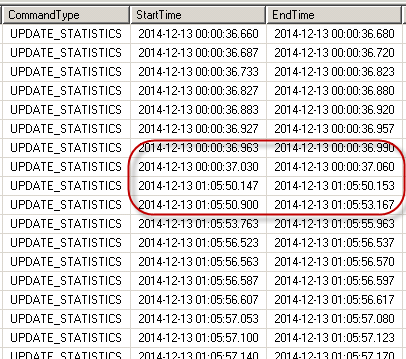I run the Ola Hallengren scripts on all of my servers for index and statistics maintenance. When I look through the command log table, I notice long periods of time between a command ending, and the next command starting. Sometimes this gap is over an hour.
Does anyone else observe this on their systems? Is there something I can do to shorten the (I'm guessing) discovery time between items to maintain? Below is the parameter set I'm running them with.
sqlcmd -E -S $(ESCAPE_SQUOTE(SRVR)) -d master -Q "EXECUTE [dbo].[IndexOptimize]
@Databases = 'USER_DATABASES',
@LogToTable = 'Y',
@FragmentationLow = NULL,
@FragmentationMedium = 'INDEX_REORGANIZE,INDEX_REBUILD_ONLINE,INDEX_REBUILD_OFFLINE',
@FragmentationHigh = 'INDEX_REBUILD_ONLINE,INDEX_REBUILD_OFFLINE',
@FragmentationLevel1 = 50,
@FragmentationLevel2 = 80,
@UpdateStatistics = 'ALL',
@OnlyModifiedStatistics = 'Y' " -b
So when I run this:
SELECT DATEDIFF(MINUTE, cl.StartTime, cl.EndTime)
, *
FROM master.dbo.CommandLog AS cl
WHERE cl.StartTime > '2014-12-13'
ORDER BY cl.ID
I see this:

